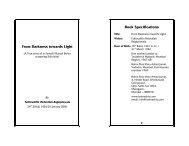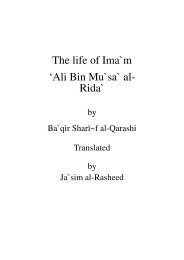The Bohra Faith - Bohra Shia Isna Ashari Jamaat
The Bohra Faith - Bohra Shia Isna Ashari Jamaat
The Bohra Faith - Bohra Shia Isna Ashari Jamaat
You also want an ePaper? Increase the reach of your titles
YUMPU automatically turns print PDFs into web optimized ePapers that Google loves.
<strong>The</strong> <strong>Bohra</strong> <strong>Faith</strong> 37 38 <strong>The</strong> <strong>Bohra</strong> <strong>Faith</strong><br />
night. Later, Ismail adopted the name of Abdullah. Sadiq<br />
Ali draws the following conclusions: It (book called<br />
Asraru'n-Nutaqa) further relates that both Abdullah and<br />
Ismail almost resembled each other physically, and none<br />
among those present could perceive the death of<br />
Abdullah due to an alikeness among the identical twins<br />
and therefore, the death was considered that of Ismail.<br />
On that juncture, Ja’far Sadik was constrained to remain<br />
silent, since the Abbasids had conspired to kill Ismail<br />
and therefore, it became a mystery, making Ismail<br />
publicly dead during his father's time, but in reality he<br />
was not dead (Sadiq Ali, 143).<br />
<strong>The</strong> issue of whether or not Ismail passed away<br />
during the lifetime of his father is central to the debate<br />
behind the succession to Imam Sadiq (AS). Another<br />
central question to the debate regarding the succession<br />
to Imam Sadiq (AS) is whether or not a change of nass<br />
occurred. Ithna <strong>Ashari</strong>s claim that there was a change of<br />
nass decreed by Allah (SWT). Initially, Imam Sadiq (AS)<br />
had designated that Ismail would be his successor.<br />
However, supposedly, Allah (SWT) revealed to Imam<br />
Sadiq (AS) that Imam Musa Kazim (AS) should replace<br />
Ismail as the successor of Imam Sadiq (AS). <strong>The</strong> Ismailis<br />
argue that the hadith about the change of nass is<br />
fabricated. Also, the Ismailis believe that Allah (SWT)<br />
would not change a decree on the designation of<br />
Imammate. <strong>The</strong>y quote the following hadith: "Verily,<br />
God makes changes in everything except in the matter<br />
of Imam" (Sadiq Ali, 148). Also, some Ismailis claim that<br />
the Imams know the unseen and the future. Since they<br />
have the knowledge of the unseen, the declaration of<br />
the change of nass would imply that the Imam is<br />
deficient in his capabilities. Sadiq Ali quotes Sachedina<br />
from Islamic Messianism, "'It implied God's change of<br />
mind (bada) because of a new consideration, caused by<br />
the death of Ismail. However, such connotations in the<br />
doctrine of bada raised serious questions about the<br />
nature of God's knowledge, and indirectly, about the<br />
ability of the Imams to prophecy future occurrences"<br />
(Sadiq Ali, 148). <strong>The</strong> Ithna <strong>Ashari</strong>s maintain that the<br />
Imams have knowledge of some aspects of the unseen;<br />
but, certain abrogations can be made in injunctions<br />
which is a reflection of the Divine Will. <strong>The</strong> issue of the<br />
change of nass is vital to the discussion about the<br />
succession to Imam Sadiq (AS).<br />
In order to maintain legitimacy in the face of<br />
criticisms from the Ithna <strong>Ashari</strong>s, the Ismailis also have<br />
various refutations of the Ithna <strong>Ashari</strong> doctrines. <strong>The</strong><br />
Ismailis ridicule the Ithna <strong>Ashari</strong>s' view on Imam Mahdi<br />
(AS). <strong>The</strong> Ithna , <strong>Ashari</strong>s believe that their twelfth ,<br />
Imam, Imam Mahdi (AS), did not pass away and<br />
remains in occultation till the present day and will return<br />
to the Earth's physical plane before the Day of<br />
Judgement. In Haft Bab, an early Ismaili text that was<br />
written more than five hundred years ago, the author<br />
contends that no human being can have such a large<br />
lifespan. "And, every intelligent man knows that no<br />
human being can live for five hundred years, and cannot<br />
therefore remain all that time hidden in a cave" (Haft<br />
Bab, 15). <strong>The</strong> Ithna <strong>Ashari</strong>s might argue that Prophet<br />
Nuh (AS) also lived for one thousand years, that Prophet<br />
Khidr's lifetime spanned a great deal of time, and the<br />
Sleepers of the Cave also lived beyond their average<br />
lifespan. To this argument the author of Haft Bab replies,<br />
" We would say to this that all such stories require tawil




